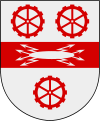Sundbyberg Municipality
| Sundbyberg Municipality Sundbybergs kommun | ||
|---|---|---|
| Municipality | ||
| ||
 | ||
| Country | Sweden | |
| County | Stockholm County | |
| Seat | Sundbyberg | |
| Area[1] | ||
| • Total | 8.77 km2 (3.39 sq mi) | |
| • Land | 8.67 km2 (3.35 sq mi) | |
| • Water | 0.1 km2 (0.04 sq mi) | |
| Area as of January 1, 2014. | ||
| Population (June 30, 2016)[2] | ||
| • Total | 46,870 | |
| • Density | 5,300/km2 (14,000/sq mi) | |
| Time zone | CET (UTC+1) | |
| • Summer (DST) | CEST (UTC+2) | |
| ISO 3166 code | SE | |
| Province | Uppland | |
| Municipal code | 0183 | |
| Website | www.sundbyberg.se | |
| Density is calculated using land area only. | ||
Sundbyberg Municipality (Sundbybergs kommun or Sundbybergs stad) is a municipality in Stockholm County in east central Sweden, just north of the capital Stockholm. Sundbyberg is wholly within the Stockholm urban area and has a 100% urban population.
Sundbyberg was detached from Bromma (which since 1916 is in Stockholm Municipality) in 1888 as a market town (köping). It got the title of a city in 1927. In 1949 parts of Solna Municipality and Spånga (when the rest of Spånga was amalgamated into Stockholm) were added. A proposed merger with Solna in 1971 was never implemented, making Sundbyberg, with an area of 8.83 square kilometres (3.41 sq mi), the smallest municipality in Sweden, but also the most densely populated. The municipality prefers to call itself a city, which, however, has no legal significance.

History
Sundbyberg was for a long time only an area of small agriculture value and most of all used as a place to spend summer for rich families in the city. In 1863 almost the entire area was bought by Anders Petter Löfström, including Duvbo Estate, who began building houses there. In 1870 the first industrial plot was sold and from there the town did expand with railroad, houses, industries and community services of all kind. A. P. Löfström also donated to the municipality, all land for roads, streets, parks, school, church and other public areas.
Sundbyberg never became a suburb but a totally independent industrial town on its own.
Industry
The 44,090 inhabitants live in roughly 17,000 apartments. The industrial policy of the municipality is to provide one job opportunity for every apartment, thus 17,000 jobs. So unlike other municipalities in Metropolitan Stockholm, Sundbyberg is not a bedroom suburb wherefrom people commute to Stockholm, but also a place commuted to from outside. In total, 12,000 commuters travel to or from Sundbyberg every day.
Public transportation
Sundbyberg is well served by the Stockholm public transport system. There are several metro stations as well as one Stockholm commuter rail station and plenty of bus routes. Even some main line trains call at Sundbyberg. 1925-1959 Sundbyberg was served by trams. Light railway returned to Sundbyberg in October 2013 when Tvärbanan light rail service was extended from Sickla Udde via Alvik to Solna centrum. The line runs through Central Sundbyberg with tracks laid in the street and has two stops within the municipality. A northern light railway branch from Ulvsunda to Kista will pass through Rissne.[3] Construction is expected to start in 2017.


Districts
- Central Sundbyberg
- Duvbo
- Hallonbergen
- Lilla Alby
- Rissne
- Storskogen
- Ursvik
- Ör
Sundbyberg Life
There are plenty of nice shops in the Central Sundbyberg area, which makes the little city a bit independent.
Sports
The following sports clubs are located in Sundbyberg:
- Sundbybergs IK
- Storskogens SK
- Real Sundbyberg [4]
References
- ↑ "Statistiska centralbyrån, Kommunarealer den 1 januari 2014" (Microsoft Excel) (in Swedish). Statistics Sweden. Retrieved 2014-04-18.
- ↑ "Folkmängd i riket, län och kommuner 30 juni 2016" (in Swedish). Statistics Sweden. August 17, 2016. Retrieved August 17, 2016.
- ↑ http://www.sll.se/verksamhet/kollektivtrafik/Aktuella-projekt/Tvarbanan-Kista-Helenelund/
- ↑ "REAL SUNDBYBERG IDROTTSFÖRENING - Företagsinformation". www.allabolag.se. Retrieved 2015-09-13.
External links
- Sundbyberg Municipality - Official site
- Sundbyberg Museum & Archive - Official site
Further reading
- Sundbyberg Den nya Förstaden, H. Österberg,Sundbybergs Museum
- Sundbyberg under Köpingtiden, H. Österberg,Sundbybergs Museum
- Sundbyberg den 113:e Staden, H. Österberg,Sundbybergs Museum
- Sundbyberg i Gamla Bilder, H. Österberg, Sundbybergs Museum
- Sundbyberg bygger en Kyrka, H. Österberg, Sundbybergs Museum
- Sundbyberg - om hus och miljöer, Eva Söderlind
Gallery
 Sundbyberg is served by commuter trains
Sundbyberg is served by commuter trains Commuter rail - Sundbyberg station
Commuter rail - Sundbyberg station
Coordinates: 59°22′N 17°58′E / 59.367°N 17.967°E
